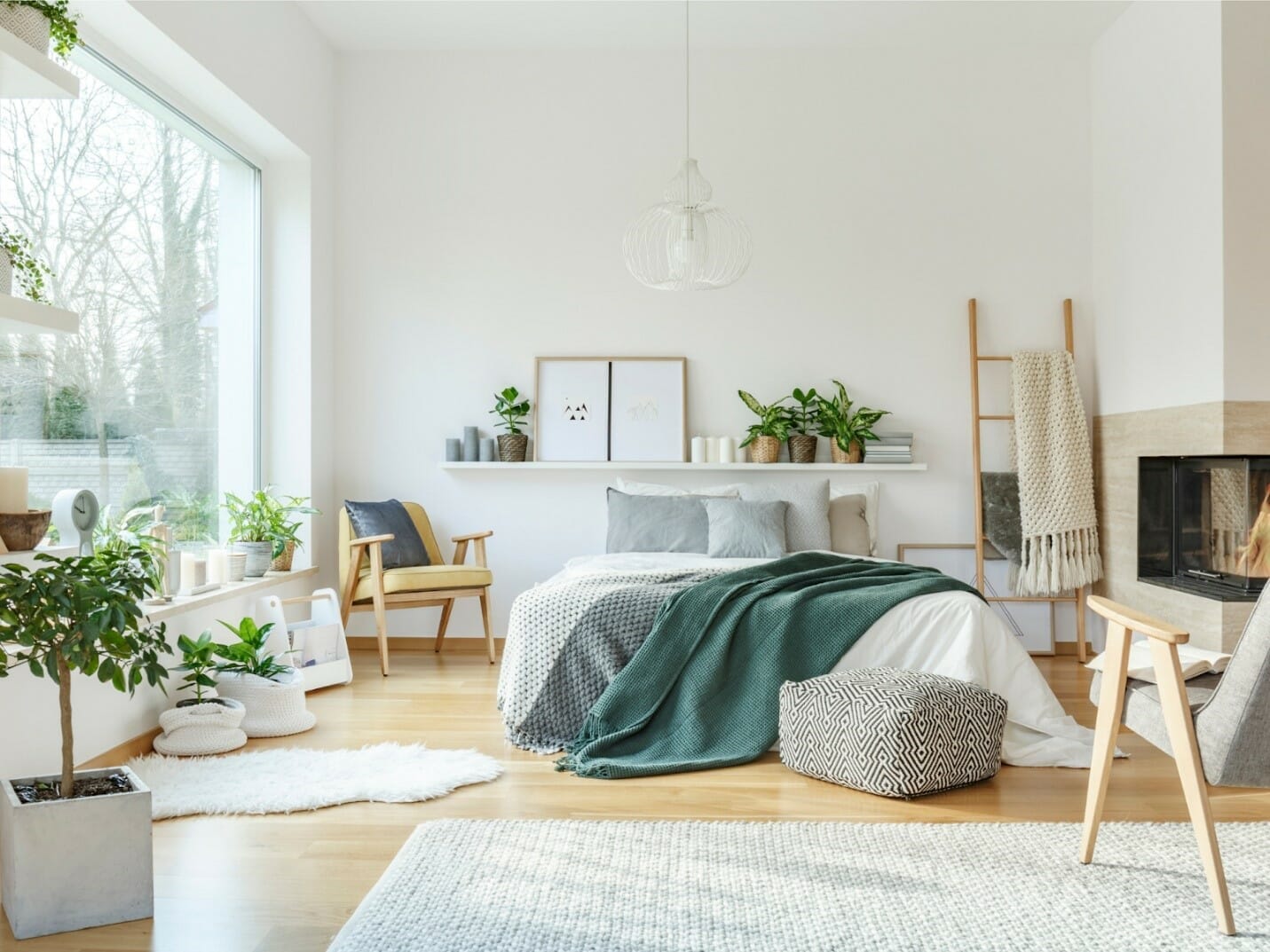
Is having a disorganized home such a big deal? Why not let people live how they want to live?
Having a clean, comfortable home affects people in different ways:

Keeping a clean, organized home is well worth all the physical, mental, emotional, and social benefits that come with it.

From sleep quality to infection control, cleanliness affects how well your body functions from day to day.
Here are a few ways keeping an orderly environment can help you physically:
Keeping a clean home reduces the risk of illness-causing pathogens being passed to residents of the home.
Food preparation areas should be sanitary, especially after handling raw meat.
Bathroom areas should be cleaned regularly, and animal waste should be taken care of to prevent disease.
People with cluttered homes are more likely to experience insomnia. It’s hard to know if it stems from increased stress levels, difficulty getting comfortable in a cluttered space, or from another cause, but cleaning up clutter should help you get a better
night’s sleep.
Allergies and asthma attacks can be triggered by dust, pet hair and dander, and mold. Keeping homes free of these triggers can improve allergy and asthma symptoms.

The state of your home can have profound effects on your mental state. A cluttered, disorganized space can stress and overwhelm us. Severely cluttered homes can also cause feelings of shame and anxiety. Here are a few ways keeping your home in order can help you function well mentally:
A clean, uncluttered space helps our minds stay on task without distraction. When we see more items in our line of sight, it can actually slow down our brain’s processing speed and make it more difficult to focus.
When we constantly look around us and see work that needs to be done, it’s difficult to feel calm. How can we relax when we’re surrounded by chaos? Maintaining a clean, organized space will create tranquility and peace-of-mind.
Setting your home in order can be empowering! When you are able to make your space look and feel the way you want it to be, you feel a sense of accomplishment.
When your home is constantly in good condition, you can depend on it as a place to relax and feel at peace. Regardless of what happens outside your home, you have a refuge where you can retreat from the world.
Creativity needs margin and blank space to grow. When your space is not distracting from your thought process, your brain can focus on new ideas.

Just as tasks requiring deep thought can be difficult when our homes are chaotic, our emotions can also be hard to settle when our environment is in upheaval. Here are some emotional benefits to improving the cleanliness of your home:
When you’re in a clean, comfortable environment, you feel better emotionally. Many studies show a relationship between messy homes and unhappiness.
Not only does being in a clean, restful environment contribute to being better able to focus and be mindful, the act of cleaning itself actually offers an opportunity to practice mindfulness. Being mindful of the task at hand can decrease feelings of anxiety and increase feelings of inspiration.
Emotional regulation is the ability to respond to your emotions mindfully. This skill can help you reframe negative emotions and cope with stress. When your home is less cluttered, you are better able to attend to your emotions and find peace.

Your home doesn’t only affect you—it also has an effect on the people around you. When your home is messy and disorganized, it can actually hinder your relationships. Here are some ways cleaning and organizing can benefit you socially:
Cleaning up can create a welcoming space for you to spend time with those you care about. When your home is messy and disorganized, it can be difficult, or even embarrassing, to host others.
You may feel embarrassed about the state of your home, or your friends may not be comfortable there due to cleanliness issues, a lack of seating due to spaces being taken up by clutter, and so on.
When your home is clean and uncluttered, there is space for family to come and stay. Even if you need to set up cots or sleeping bags to accommodate extra guests, they can still be comfortable with you. With a clean floor and stored belongings, this can become a reality.
In severe cases, disorganization and lack of cleanliness can lead to structural issues with your home. Appliances may fall into disrepair and become hazardous, or the home’s structure can even be compromised by the weight of your belongings.
When your things are in order, there is no danger of needing to relocate. However, when your things are in order, there is no danger of being forced to relocate. That stress is non-existent. At a certain point, a health inspector could become involved.

Everyone can improve the state of their homes—we all struggle to keep things clean and hang on to only the possessions we really need.
However, when we take the necessary steps to tidy up and declutter, we can see benefits in many different areas of our lives: physically, mentally, emotionally, and socially.
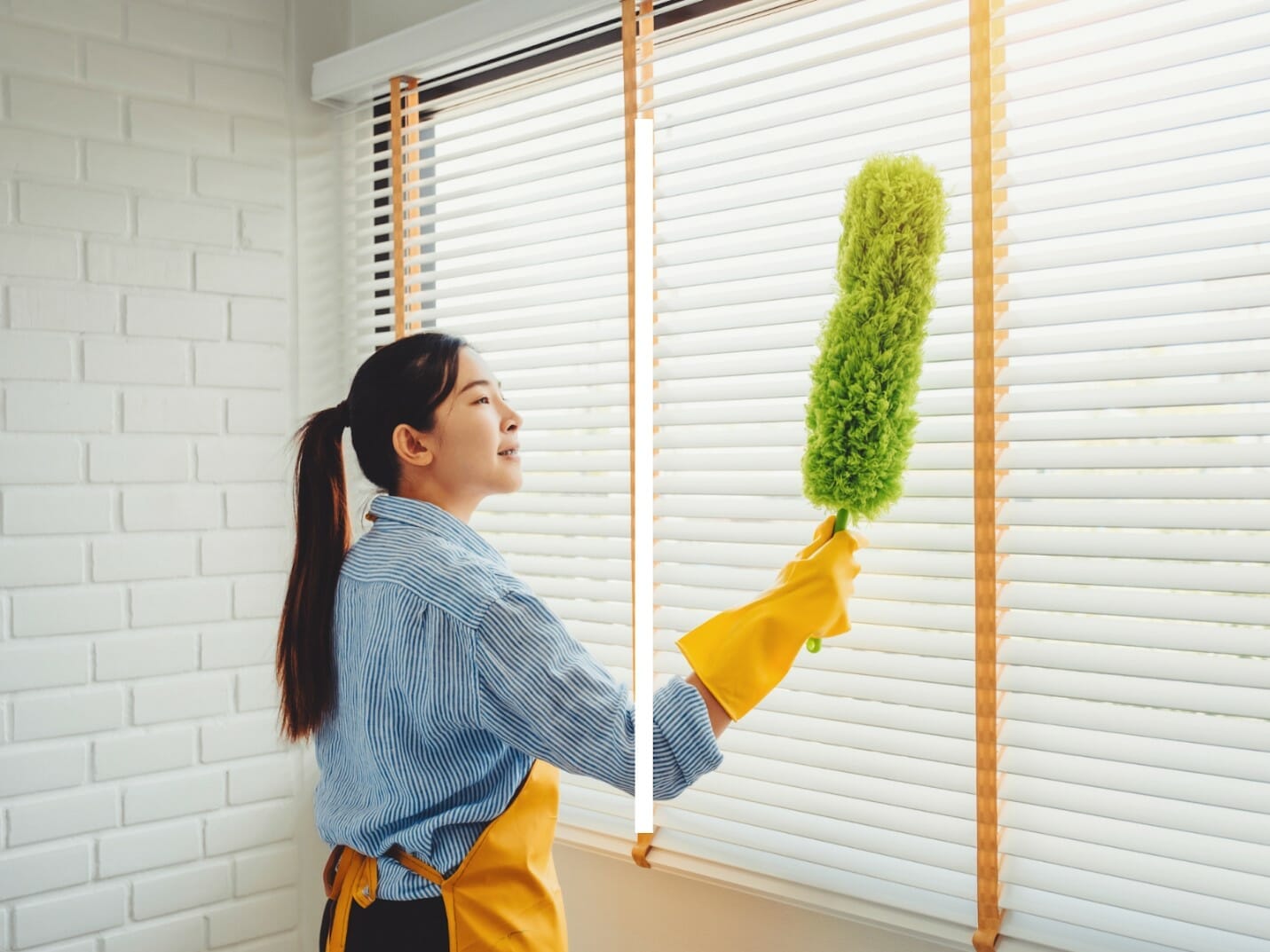
Whether or not you’ve actually done it, spring cleaning is backed up by centuries of tradition. Many cultures bring a spring cleaning period into their yearly rhythms. For all cultures, the kickoff for spring cleaning is marked by longer days and more sun.
As sunlight hours increase, our bodies produce less melatonin, helping us feel more awake after months of cozy winter slowness. We also have more daylight to accomplish tasks we’ve been putting off.
Even if spring cleaning isn’t part of your personal yearly traditions, you can start now.
With so many blogs, books, and shows promoting organization, resources with ideas are everywhere. Keep reading to learn about our favorite spring cleaning strategies.

The most important step is knowing where to start. Take a walk around your house and decide what needs attention first.
If you’re a list-maker, you can write down your plan of attack. (Or you can just follow the messy vibes.) Knowing your focus makes it easier to jump in and get the work done.
You can also make a list of which days you want to accomplish certain tasks. Choosing just one room, drawer, or cupboard that you want to clean each day can make the entire process less overwhelming. The important thing is that you are moving forward!
It’s hard to clean when you don’t have what you need.
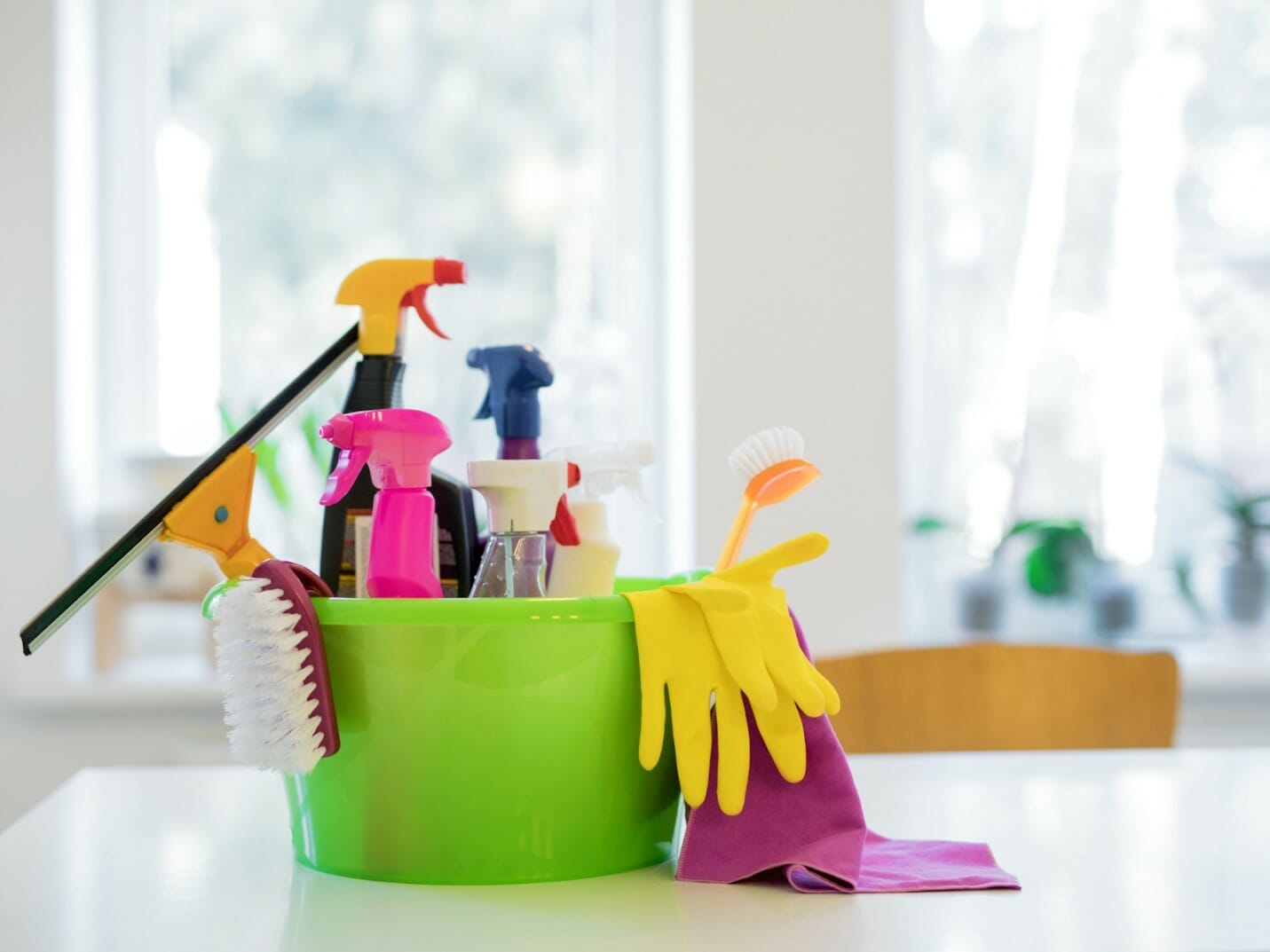
Make sure any cleaning tools or chemicals you need are in an easy-to-find place. It can be helpful to have a caddy or bucket that you can bring from room to room.
Make sure you have what you need, but don’t go overboard. It’s easy to turn a need for supplies into a shopping trip or a reason to procrastinate.
Don’t fall into that trap!
If you don’t have what you need to deep clean today, you don’t have to wait to get started. You can still put items away or, better yet, find items to get rid of.
Most of us don’t have the time or the desire to go on a cleaning rampage. We have limited time and many responsibilities. (But if you’re a person who works well by focusing and cleaning all day, more power to you!)

For the rest of us, setting a timer can be an effective way to get your spring cleaning done, a little bit at a time. Choose an area to clean and a set amount of time (we suggest starting with just 15-20 minutes). Get your timer going and then work hard until it goes off.
Go back to the same area each day with your same timer strategy until it’s clean. Only then is it time to move on to the next part of your home.
Bit by bit, the mess will disappear.
Having a clean home is its own reward, but building some kind of treat into the process always helps. Here are some ways to treat yourself:

Just be cautious about buying yourself something as a cleaning reward.
Often, having too much stuff is the reason our homes get out of hand in the first place. Try to find some other way to pat yourself on the back.
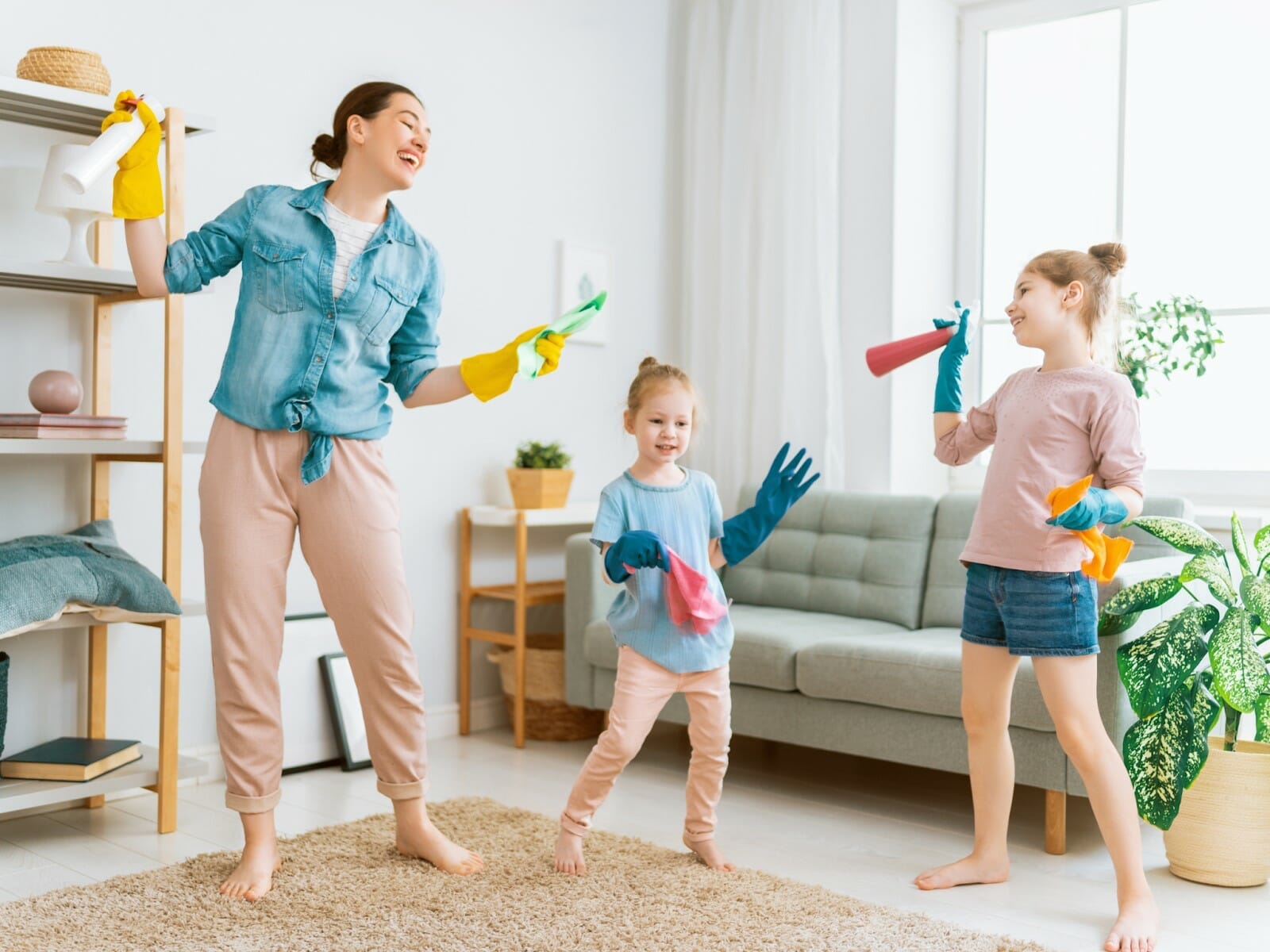
Scientific research shows that making our dreaded tasks into games can help us be more productive and motivated. There are many apps available that reward users for their accomplishments by letting them progress in a game or giving them a virtual gold star.
You don’t need an app to gamify your spring cleaning, however. There are dozens of analog ways to make cleaning into a fun challenge. Here are a few of our favorites.
Brackets are everywhere in the spring, and you can use them to motivate yourself even after the March Madness finals. Download a bracket and fill it out. There are a number of ways you could apply this to spring cleaning:
The ultimate challenge winner gets to decide where everyone goes out for dinner or a treat.
Sometimes, we have so much stuff it’s hard to know where to put it or keep our spaces clean. With the 4-Box Technique, you’ll take four boxes into a room and label them:
Go through the space and categorize all the items that don’t belong in that space (the ones that do belong can be put away immediately).
The trick here is to make sure you deal with your four boxes right away. Don’t let boxes pile up in your home.
Put the stuff you’re keeping in the right place:
For days when you’re overwhelmed or short on time, the 21-Item Toss is the perfect way to get a little bit of decluttering done in as little as 5 minutes.
Grab a garbage bag—or one of the plastic grocery bags so many of us stow under the sink. Walk through your home and find 21 things to throw away. You can gamify it by timing yourself.
Don’t think too hard—if you don’t use it or need it, out it goes!
If you feel like you can’t deal with your home situation on your own, Bio-One has your back. Our discreet team of compassionate, expert cleaners can help you with your home situation—no mess is too big.
Call us today for a consultation.

Clutter has a habit of creeping into all available spaces, especially in households with children. Clothes, toys, and food messes can pile up quickly, no matter how old your kids are. And you have your own belongings to worry about too!
Thankfully, you’re not alone in the fight to stay organized. Even the most savvy housekeeping masters (looking at you, Marie Kondo) admit to struggling with messiness once they have kids.
Everyone deals with messes and clutter at some point in life. These are normal parts of being human. From time to time, however, it’s a good idea to get the lack of organization under control.
A tidier space is easier to keep clean, and it helps with mental health and productivity (among many other benefits we won’t get into here).
So if you have been feeling overwhelmed with the state of your home lately, we can help! Read on for 5 tips for cleaning and organizing with kids.
Whether we like it or not, kids—no matter their age!—are always watching. Monkey see, monkey do, as the old saying goes.
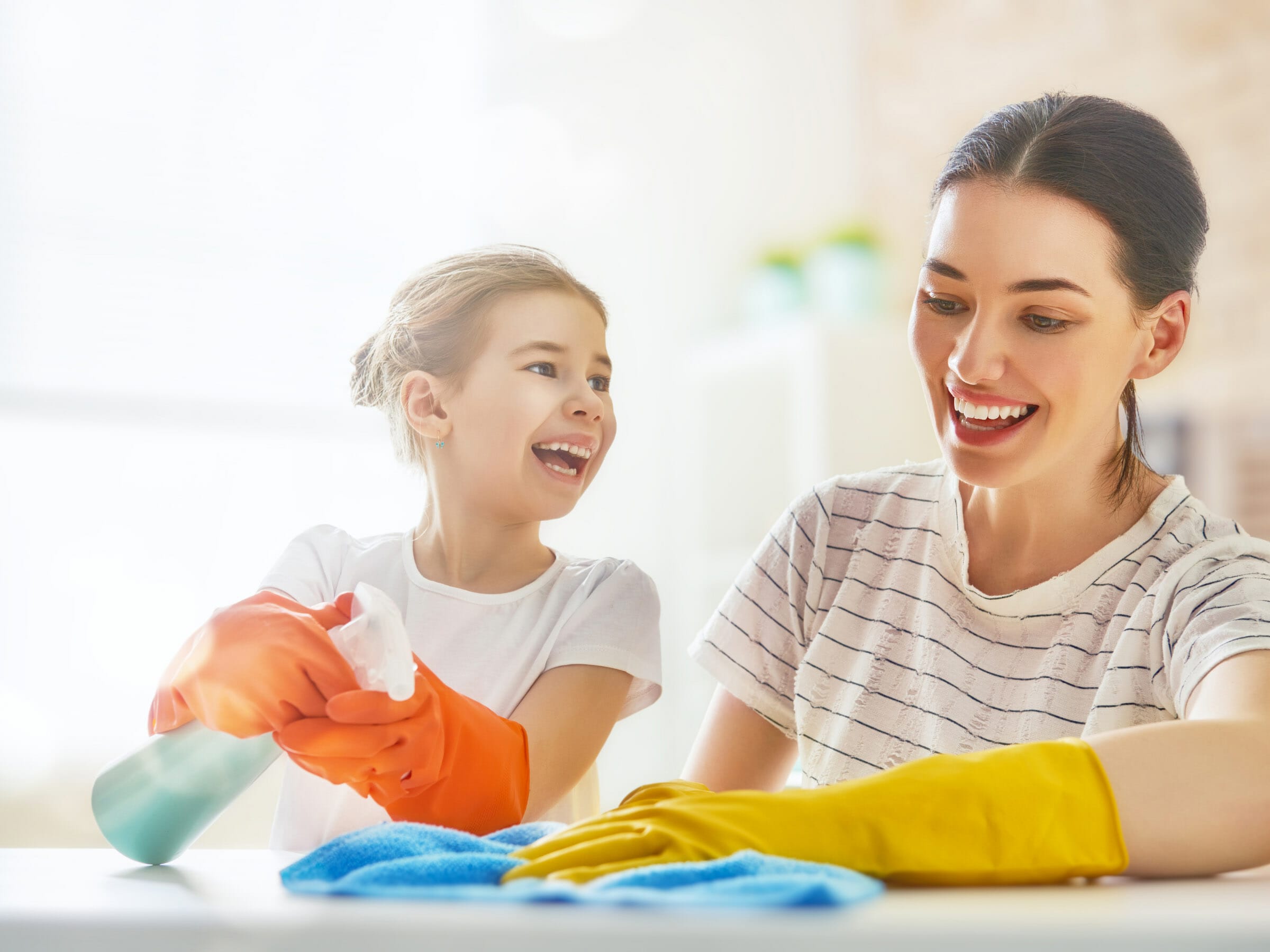
When it comes to clearing clutter, remember that change starts with you. The good news is that being an example of cleanliness does not need to be overwhelming.
Start small by considering only what you own and the spaces you mostly use yourself (yes, we know kids get into just about everything).
Take a look at your bedroom, for example.
If the bedroom looks tidy already, look around the other spaces in the house. What items of yours seem to be out of place? Do any surfaces you have used still need to be cleaned?
Now pick one item or area you want to prioritize. Start making a daily habit of putting the item away or cleaning up the space you’ve chosen. Once you feel you’ve mastered the habit, move on to another task.
When you feel more in control of your own mess, chances are you’ll start to feel more capable of helping your kids tackle theirs—even if it’s just one step at a time!
Checking boxes is incredibly satisfying for most kids and teens alike. If yours are old enough to participate in brainstorming, sit down together to write a list of daily and weekly chores. Then decorate!
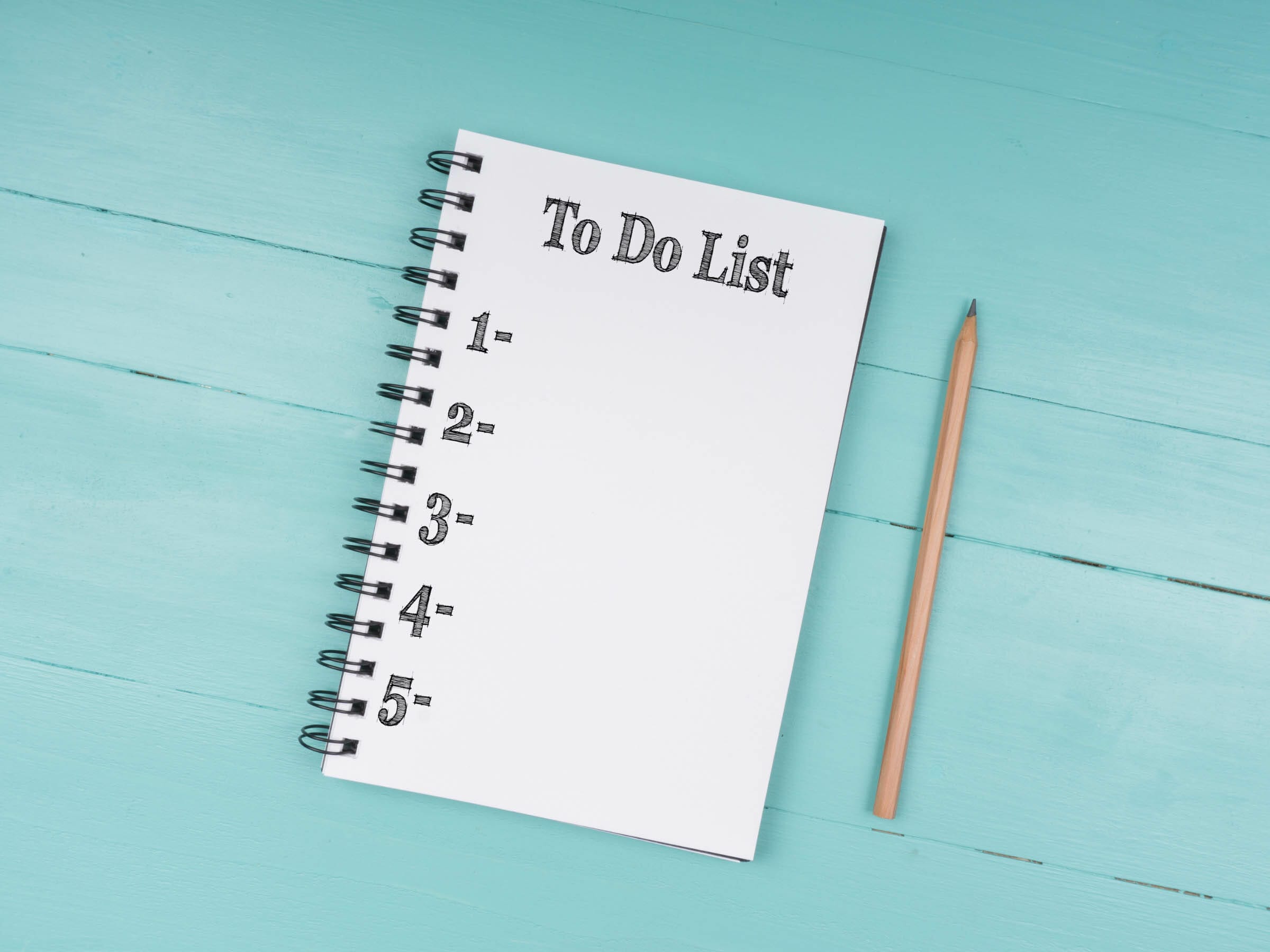
Stickers, crayons, sparkly glue, and lots of other craft supplies can turn a boring list into an exciting one. Keep the finished list where everyone can see it every day. Fridges are a great option.
Think of ways to celebrate together once all the spaces in the job chart have been filled, or when some other related goal has been met. Encourage your kids to contribute ideas for goals and rewards.
Here are some ideas of our own to get you started:
Simple and inexpensive rewards can help keep everyone from younger children to teens excited about reaching their housekeeping goals without putting more stress on you as the parent.
Help your kids (and yourself) get through the drudgery of decluttering by turning it into a game. Teach them that every item has a “home” and show each child where it belongs. Everyone knows the cleanup song: 🎶 “Clean up. Clean up. Sing along as you pick up…” 🎶Then make organizing fun!
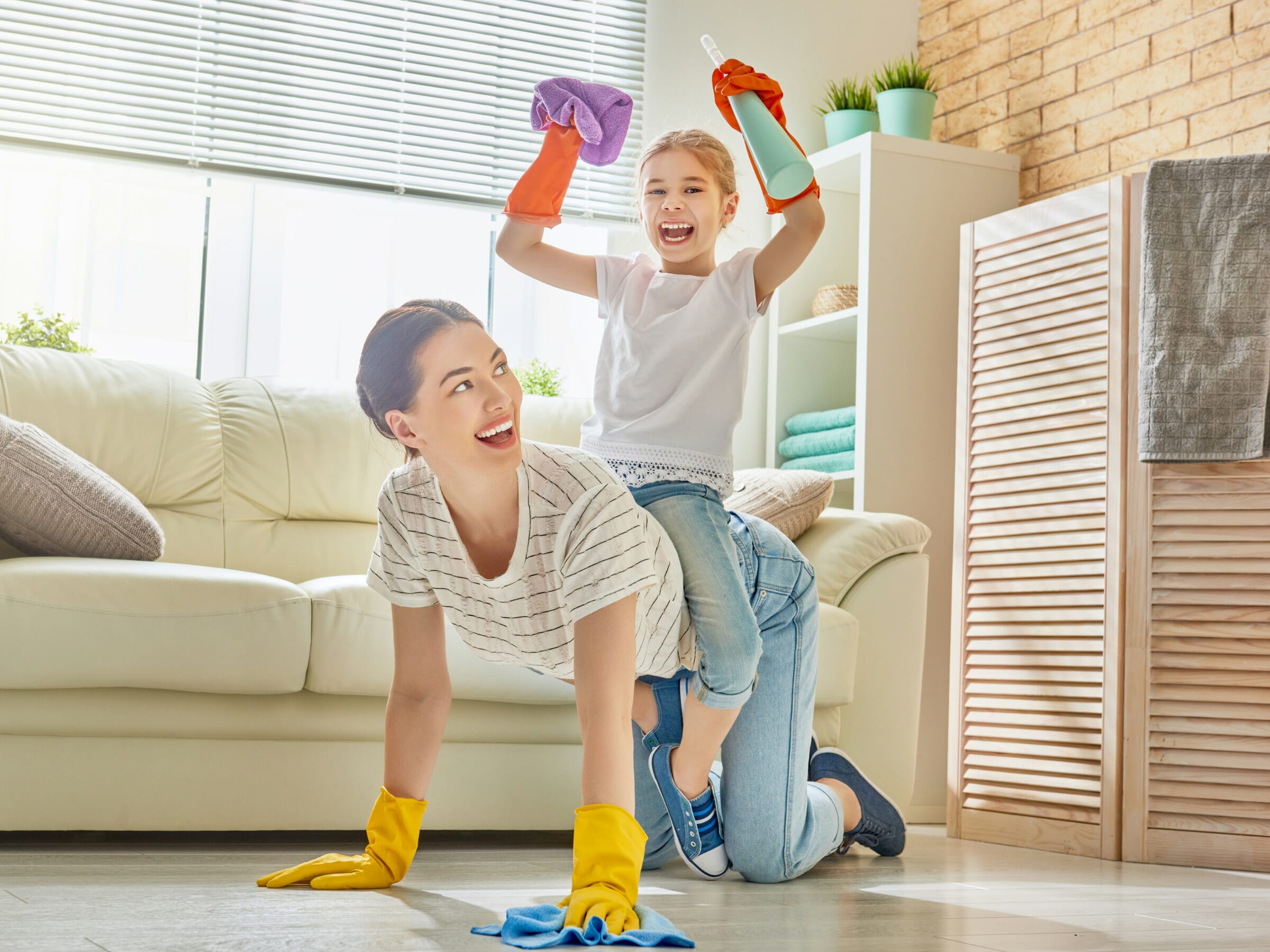
Here are some ideas to help gamify cleaning and organizing:
Some kids love a healthy dose of competition. Races and timed challenges can help the cleaning get done quicker, get everyone’s blood moving, and bring out some good laughs!
For younger children, playing pretend may help decluttering and cleaning seem like less of a chore and more of an adventure. Think about your child’s favorite characters and how you can integrate them into a simple cleaning routine.
Scavenger hunts can be especially fun for clearing clutter. Find items you can hide throughout the house and have the kids look for them as they clean. This can be a particularly good option for older children and teens as it keeps the cleanup task engaging.
The difficulty level can be adjusted depending on age, of course. Consider offering some kind of reward or celebration at the end as an added incentive!
Reality hurts the most when it fails to meet our expectations. So, to avoid unnecessary pain, manage your expectations of your kids and their cleaning abilities!
Prioritize progress over perfection. Appreciate the value of a task getting done at all, even if it seems small.
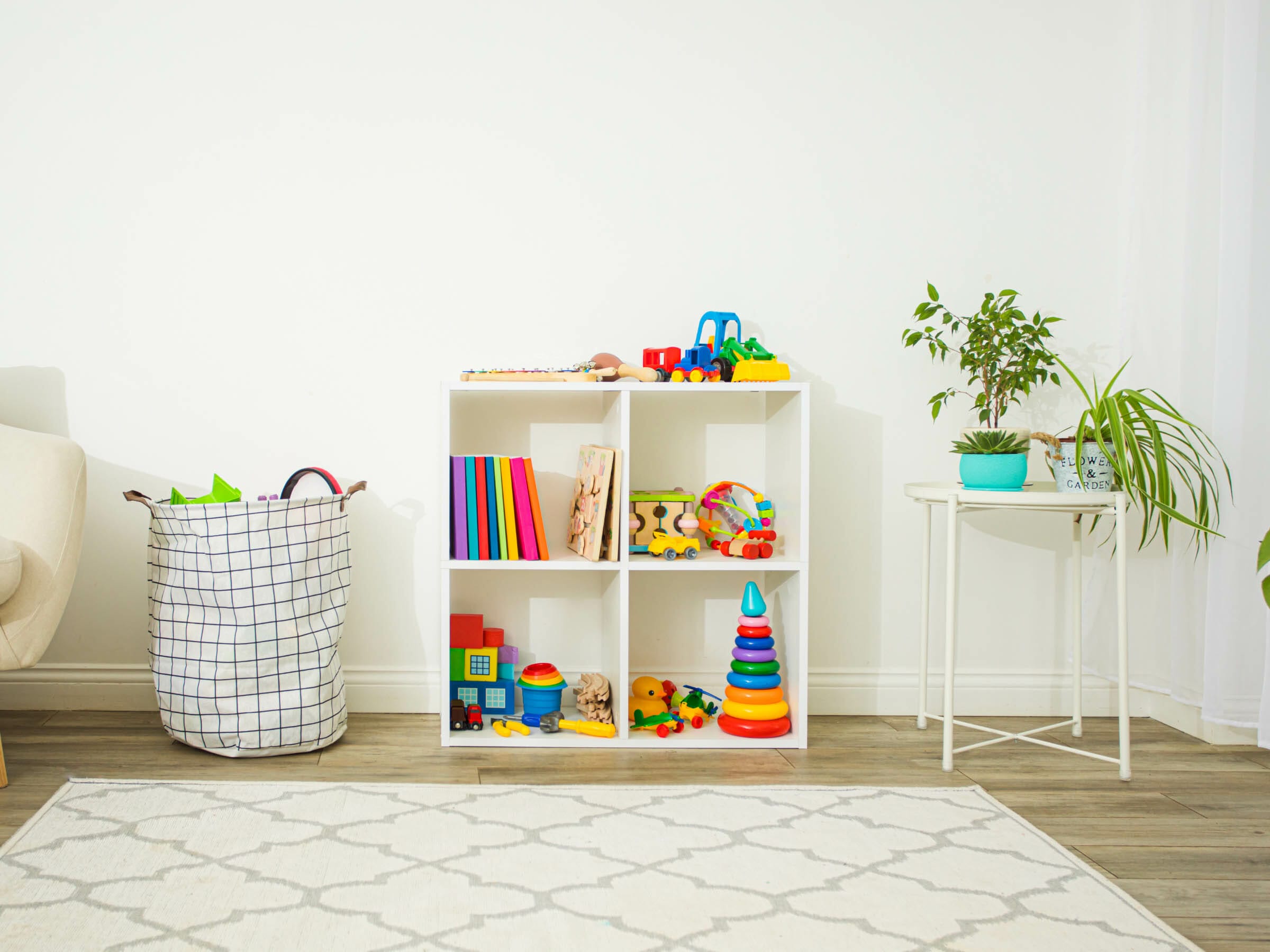
On occasion, kids may break something or use a tool improperly while cleaning. Try to foresee hazards and keep a close watch as your kids help around the house.
Educate your child on how to perform a task or care for an item correctly. If needed, block off access to dangerous cleaning tools your child may try to access when you are not with them.
Caring for kids requires wearing many hats and tackling lots of daily tasks—whether you’re home with them full-time or juggling at-home and work responsibilities. When cleaning feels far too overwhelming, you should ask for help.
Many adults struggle with asking for help, particularly parents. Do your best to put aside feelings of guilt or the fear of inconveniencing someone. Your health comes first! And when you feel better, the rest of your family benefits too.
Consider these resources for extra help:

Whether you pay someone or get help for free, finding people to support you goes a long way.
Sometimes decluttering and cleaning require help from professionals. At Bio-One, we’re a close-knit crew devoted to cleaning up what others won’t or can’t.
We are fully trained, licensed, and insured to take care of any mess you can think of. From animal hoarding to active crime scenes, we’ve sanitized, removed, and disposed of it all. In our 20+ years of experience, we’ve definitely had our work cut out for us.
Our mission is simple: help first, business second. Call us at (330) 888-5665 anytime, day or night. We’ll answer!
If you prefer written communication, you can fill out a service request on our website.
We look forward to meeting you!
Gary Maxey in Savannah recently cleaned homeless veteran's tiny homes. This is part of a tiny house project in Savannah, Georgia where tiny homes are provided for homeless veterans either permenantly or as a transitional place. At Bio-One, we are honored to be a part of causes like this. We are here to help and love when we can help make a difference.
If you know of someone in need of our services, please take a look at our locations to find the nearest Bio-One office near you. Stay safe!
Megan and Amanda Boccardi, owners of Bio-One of STC and Bio-One of Central MO help clean and disinfect a local gym - a St. Peter's Fitness Center. As COVID-19 is hitting the United States everyday, Bio-One continues to take action. Help first is what we do and we'll be here during this time of need.
If you know of someone in need of our services, please take a look at our locations to find the nearest Bio-One office near you. Stay safe!
Huge thank you to Cheryl Chiasson for sharing your knowledge and giving a couple of owners an opportunity to experience a hoarding job while in Denver! We love when trainees go out on job scenes and have the opportunity to chat with local offices!
If you know of someone in need of our services, please take a look at our locations to find the nearest Bio-One office near you. Stay safe!
Time for spring cleaning! Don't let this scare you, this is a time to purge and freshen up your space!
Here are 20 things to throw away right now:
1. Shoes you don't wear
2. Old makeup or bathroom products
3. Expired coupons
4. Cords that you can't identify
5. Tupperware lids that have no match
6. Old toothbrushes
7. Socks with no match
8. Dried out markers and pens
9. Unused mugs
10. Unused instruction manuals
11. Shopping bags you've convinced yourself you'll wrap a present in
12. Foods spoiling or collecting freezer burn
13. Old receipts
14. Paperwork you don't need anymore
15. Excess holiday decor
16. Wire hangers
17. Appliances you don't ever use
18. Travel toiletries stolen from hotels
19. Broken things you won't be fixing
20. Old magazines
If you know of someone in need of our services, please take a look at our locations to find the nearest Bio-One office near you. Check out our services.